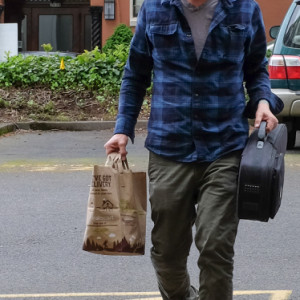Quiet and a pear tree
Bella is making photos of what grows in her yard. She took me with her virtually. As we toured the yard, we talked about light and background, angle and focus, when to go low or high. She pouted a bit, “It’s too late for the pear tree. The flowers are gone.” I said go look. What’s there now? Photograph that. Honor what’s there. If you go higher, you can include the fallen petals under the tree. What do you think? Back up a little. Now go in closer. Which one works better? Keep working till you get something that honors the tree. She chose this one.
In the afternoon her father brought me some oranges and bananas, a new and improved mask Cristina made, and the alto ukulele I bought him years ago (Extra) so I can see if I remember anything from my uke lessons in the seventh grade in Hawai’i.
And Paula called from France. We hadn’t talked since before the lockdowns. First we established that our children and partners are well and as safe possible. One of our mutual friends has symptoms but cannot get testing, we worry for her, love her. Then the question, how is it for you?
I’m quiet. Compassionate for the suffering of others, but present and very still. Apart from time with Bella and Sue each day on one device or another, I watch clouds and think about movement and stillness. All the running I have done: the teaching, research, publishing, theatre, meetings, organizing. It did no harm, but I pushed hard and was always spinning my wheels. The quieter I am, the quieter I want to be.
“Amazing,” she said, “I’m the same way. I’m quiet and I’m sleeping more. It feels like something larger than us has taken over. Some responsibility has been lifted, or maybe it was never there, maybe we only thought we were responsible for something. This change feels larger than movements, larger than governments. Something says stop. Stop.”
“I know. The climate movement tried to force the oil companies to leave fossil fuels in the ground. Protesters blocked roads, hung banners. The oilmen said no. Now nobody wants the oil. Corporations have to pay people to haul it away and store it.”
“I think about that too,” she hummed, “and kindness appears. People I haven’t heard from since high school check on me. How are you? Are you safe from the virus?”
“And our adult children,” I hooted. “They check on us. ‘Are you OK, Mom?’ How sweet, and how unusual.”
She laughed with me, “Yes. When everyone was in a hurry and tied to a calendar, we were too busy to think that this person I love could die. Now we can’t help thinking it, like you and the Buddhists have always said. What is the word you use?”
“Impermanence?”
“Yes, impermanence.” We sat in silence on opposite sides of the world. “And my garden,” Paula marveled. “Every new leaf is a revelation. I’ve never been with a garden the way I am this year. Even though there is terrible suffering and we grieve for all who are suffering, this bud here, this knob of petals opens to the sun. It opens in its own time. We’re not in charge.”
“We’re not in charge,” I agree. “And we are all dying, and for a change we notice that we are small and vulnerable and insignificant.” We say ‘I love you’ to each other before we say goodbye.
I am grateful to the bone for your kind words and comments, my friends. Your words have been a great comfort. I love you, and I’m turning comments off for a bit to be quieter still and to pay more attention.


Comments
Sign in or get an account to comment.


